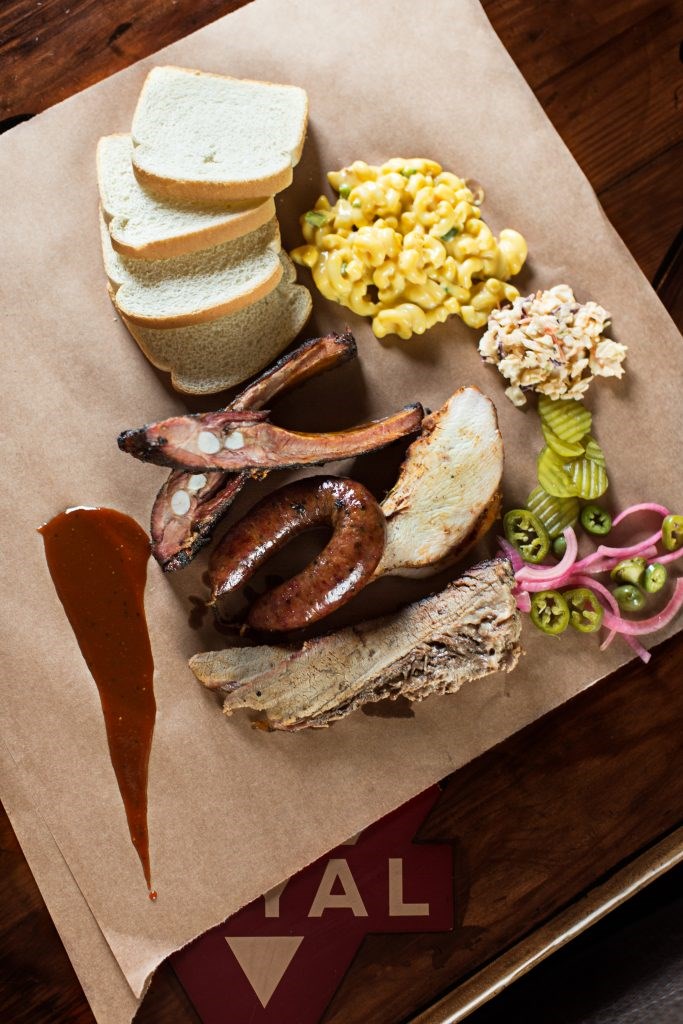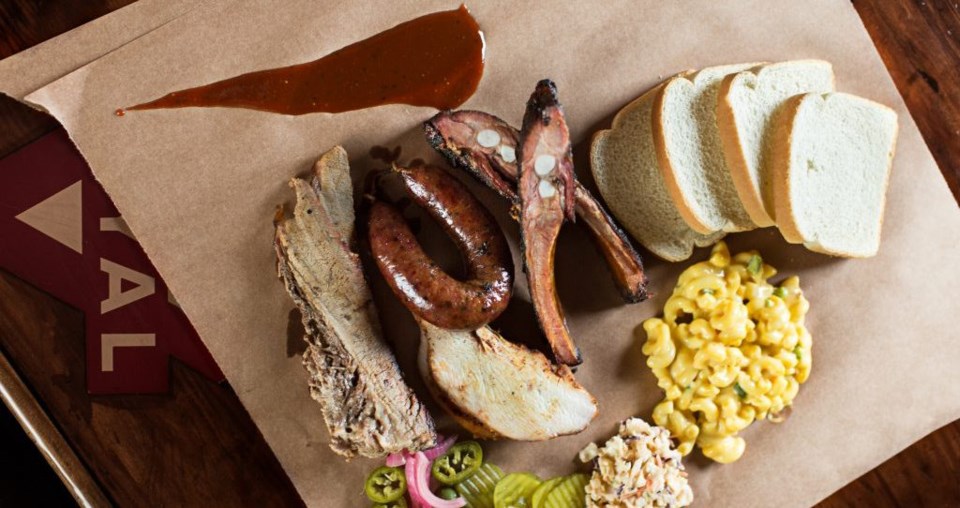When Carolina Maldonado clocks into work at 7 in the morning, the first thing she does is check on the pits and add wood to the flames. There are two in each of the Lockhart Smokehouse locations. The fires never die because if the pits go out, the smokehouse shuts down. The Dallas pits have been burning for seven years. The pits at the Plano location have glowed for three and a half.
Carolina dons gloves and, using monster tongs, drags briskets the size of boulders and slabs of pork ribs out of the darkness, slapping them down onto clean metallic surfaces, one after another. They have been smoking all night until the seasoned outside—the bark—is black all over.
“If they’ve never had brisket before, most people are like, ‘Can we get some that isn’t burned?’” Carolina says. These are the inside jokes of barbecue culture. “And I’m like, ‘No, that’s the delicious part.’ All this is just seasoning. That’s why it’s black.”
She mulls over one of 40 briskets smoked at Lockhart’s Plano in a single day. “When I was first here, I didn’t know much about it. The first time I saw a brisket, I thought it was burned too.”
Four years ago Carolina, who had waited tables at a mom-and-pop Mexican restaurant in Dallas, had never had barbecue. At least she’d never had really good barbecue, and she’d never worked in a kitchen before. Then she got a job at Lockhart’s with Owners Jill and Jeff Bergus. Now she is a pitmaster at one of Lockhart’s two locations, along with Tim McLaughlin.
A pitmaster is more than just someone who works in a barbecue pit. It more closely resembles a term of respect.
“We are in a golden age of barbecue right now, so I think pitmaster is a term that gets thrown around a lot,” Jill Bergus says. “It’s someone who can harness the forces of wood, fire and meat and make magic. For us, the ‘pitmaster’ serves as the quarterback for the team, and we all work together to create meaty goodness.”
If Lockhart’s crew aren’t barbecue royalty, then they’re at least barbecue dukes and duchesses. For decades, Jill’s family has run Kreuz Market in Lockhart, Texas, a famous meat market that has been the standard in Texas since 1900. Lockhart’s specializes in good ol’ Central Texas barbecue and is the only place in DFW where barbecue fanatics can taste Kreuz Market sausage.
It’s redundant to say that a barbecue joint is unpretentious, but I’m doing it anyway: Lockhart Smokehouse ain’t pretentious. When they first opened in Dallas, they didn’t even serve you with forks and barbecue sauce. Though fans wore them down and they now provide sauce, pickles and utensils, you still won’t get a plate. The pitmasters scrawl the day’s offerings and daily special on a huge board, along with sides like Lockhart Slaw and Spicy Mac and Cheese. When an item is sold out it’s simply scratched off the list. According to Carolina, it isn’t rare to be out of ribs by 3 p.m. and around the holidays, there are lines out the door to order and pick up their whole turkeys—smoked, like just about everything else, over Texas oak.
“Caro has very little ego and is always eager to learn more. She commands respect and freely gives it to all that work with her and learn from her,” she explains.
Everything Carolina knows she learned in the pits at Lockhart’s, where it’s so hot that a pitmaster like her steps outside into 100-degree temperatures to cool off during the summer.
The mornings before the rest of the team arrives are Carolina’s favorite time of the day: just her, her thoughts and the pork ribs. The pits at Lockhart Smokehouse in downtown Plano are in the back of the building where the smoke breathes out through a screen door into the fresh air, away from the restaurant. Inside, the atmosphere is like a ‘50s cigar club and the heat feels like a physical push. At the Dallas location, her usual territory, they are showcased right behind the counter where people feel the burn while they order their food.
“People ask us how we stay cool back there,” Carolina says, eyes twinkling. “The answer is: We don’t.”
Carolina explains that she doesn’t rely on sight to know when a brisket is done. She relies on experience, practice and touch. “When you can stick your finger in it, that means it’s done.”
We move to the counter where customers order meat by the pound. She slices everything expertly, precise with a knife.
“Barbecue is huge in Texas,” she says, wrapping up Kreuz Market sausage and a pile of pork ribs with deft flicks of her wrist. “This is a totally different style than what most kitchens do. It’s an art and it takes practice. That’s why I like it.”
Barbecue is a sloppy, grungy meal, but there is a remarkable amount of grace in the process. The ingredients for good barbecue are simple: wood, fire, smoke and meat. But mastering the process—becoming worthy of the pitmaster title—requires effort, experience and long hours in the smoke. Luckily for local barbecue lovers, that’s where Carolina is in her element.




